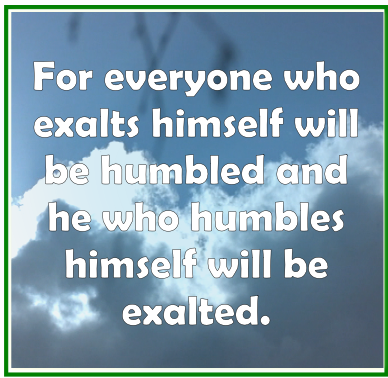28 August 2022
Ecclesiasticus 3:17-18 Hebrews 12:18-19,20,28-29 Luke 14:1,7-14
Theme: The Virtue of Humility
Today’s readings are all about humility. Our first reading from the Book of Ecclesiasticus tells us that the Lord ‘accepts the homage of the humble’ (Ecc 3:20). Therefore, ‘the greater you are the more you should behave humbly’ (Ecc 3:18). Truly great people are humble enough to listen to others and learn from them. The haughty who think they have nothing to learn from others are simply incurable fools. In our gospel reading from Luke, Jesus contrasts the behaviour of the proud fool who grabs the seats of honour at a party, and is ignominiously demoted, with the humble person who takes the lowest place and is promoted to a higher position. The gospel ends with the familiar saying of Jesus: ‘Those who exalt themselves will be humbled, and those who humble themselves will be exalted’ (Lk 14:11).
According to the poet, T.S. Eliot, ‘humility is the most difficult of all virtues to achieve; nothing dies harder than the desire to think well of self’. I agree with the first part of Eliot’s statement but not with the second. Yes, it is difficult to have true humility, but not because we think well of ourselves. To think well of ourselves is a healthy desire. The problem for many of us is that we suffer from a poor self-image. We tend to put ourselves down, at least, in our own minds. Marianne Williamson is ‘on the ball’ when she says that ‘It is our light, not our darkness, that most frightens us. We ask ourselves: Who am I to be brilliant, gorgeous, talented, fabulous?’ True humility is not about playing small out of fear of the gifts God has given us. It is rather the honest acceptance of who and what we are as children of God, created in his image and likeness. As St Paul reminds us, ‘We are God’s work of art’ (Eph 2:10). And how could God create anything that was not awesome? Yes, we are awesome creatures of a loving God who formed us with infinite love and care. True humility is recognising and accepting the wonder of our being, and of our giftedness. As the famous spiritual writer, C.S. Lewis stated: ‘Humility is not thinking less of yourself but thinking of yourself less’.
What then are we to make of Jesus’ challenge to the Pharisees about their behaviour when invited to a feast? He had noticed how they chose ‘the places of honour’ (Lk 14:7). We could be forgiven for thinking that the reason for this behaviour was their high opinion of themselves, but this is not the case. They chose the seats of honour because they wanted others to think highly of them, which is not the same thing. The desire to appear important in the eyes of others betrays an insecurity that comes from not really appreciating oneself. Those who have a genuine appreciation of their own worth do not need to put themselves ahead of others. Freed from that destructive desire, they can allow others to let their lights shine. They have no problem taking a back seat when invited to a feast.
What Jesus is challenging is the Pharisees’ selfishness and small-mindedness. They are ‘full of themselves’ and want to appear important because they do not have a true sense of their own worth as creatures of a loving God. Therefore, they look for, and need, the approval of others. We can sometimes behave like that too. We can feel so insecure about our own giftedness that we are always seeking the approval of others. Jesus calls the Pharisees (and us) to a higher standard of behaviour, the kind of behaviour that only truly free persons with a healthy self-image can practice: ‘When you give a lunch or a dinner do not ask your friends, brothers, relations, or rich neighbours, for fear they repay your courtesy by inviting you in return. No! When you have a party, invite the poor, the crippled, the lame, the blind. That they cannot repay you means that you are fortunate because repayment will be made to you when the virtuous rise again’ (Lk 14:13-14). This is the kind of behaviour that truly humble people practice – behaviour based on seeing the needs of others and tending to them. Let us, then, take up the challenge of Jesus and live our lives in humble service of others, especially those who cannot repay our love. I will end with the full text of Marianne Williamson’s inspiring reflection to which I already referred.
Our deepest fear is not that we are inadequate
Our deepest fear is that we are powerful beyond measure.
It is our light, not our darkness that most frightens us.
We ask ourselves, ‘Who am I to be brilliant, gorgeous, talented, fabulous?’
Actually, who are you not to be?
You are a child of God.
There is nothing enlightened about shrinking so that other people won’t feel insecure around you.
We are all meant to shine, as children do.
Your playing small does not serve the world.
We were born to make manifest the glory of God that is within us.
It’s not just in some of us; it’s in everyone.
And as we let our own light shine, we unconsciously give other people permission to do the same.
As we are liberated from our own fear, our presence automatically liberates others.
Fr Michael McCabe SMA, Cork
To listen to an alternative Homily from Fr Tom Casey of the SMA Media Centre, Ndola, Zambia please click on the play button below.
|
|

